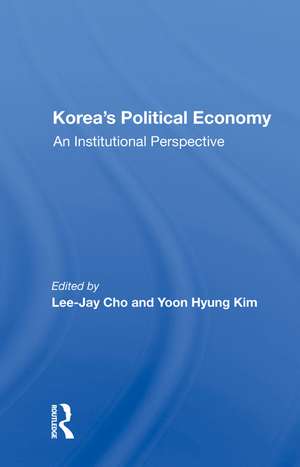Korea's Political Economy: An Institutional Perspective
Editat de Lee-Jay Choen Limba Engleză Hardback – 7 iun 2019
Preț: 783.46 lei
Preț vechi: 1114.09 lei
-30% Nou
Puncte Express: 1175
Preț estimativ în valută:
149.91€ • 163.35$ • 126.33£
149.91€ • 163.35$ • 126.33£
Carte tipărită la comandă
Livrare economică 23 aprilie-07 mai
Preluare comenzi: 021 569.72.76
Specificații
ISBN-13: 9780367016838
ISBN-10: 0367016834
Pagini: 742
Dimensiuni: 147 x 229 mm
Greutate: 1.52 kg
Ediția:1
Editura: Taylor & Francis
Colecția Routledge
Locul publicării:Oxford, United Kingdom
ISBN-10: 0367016834
Pagini: 742
Dimensiuni: 147 x 229 mm
Greutate: 1.52 kg
Ediția:1
Editura: Taylor & Francis
Colecția Routledge
Locul publicării:Oxford, United Kingdom
Cuprins
Preface -- Culture, Institutions, and Development -- Culture, Institutions, and Economic Development in East Asia -- The System of National Economic Management -- An Introduction to the Korean Model of Political Economy -- What Is the Best System of National Economic Management for Korea? -- The Specter of Anglo-Saxonization Is Haunting South Korea -- Korean Choices and Patterns of Advanced Country Development -- The Tax System -- Tax Policies and Institutional Reform -- A Proposal for Tax Reform in Korea -- Does Korea Need a Tax Reform in the 1990s? -- The Financial System -- Financial Institutions -- Institutional Reform of the Korean Financial System -- Financial Reform in South Korea -- The System of Land Ownership and Use -- Korean Land Ownership and Use -- The “Land Problem” in Korea -- More Land at Lower Prices: The Deregulation Alternative -- The Relationship Between Business Ownership and Management -- Ownership-Management Relations in Korean Business -- Big Business Groups in South Korea: Causation, Growth, and Policies -- Trade and Industrial Strategy -- Industrial Policy and Trade Regimes -- Issues and Reforms in Korea’s Industrial and Trade Policies -- Korean Industrial Policy: Legacies of the Past and Directions for the Future -- The Relationship Between Labor and Management -- Korean Labor-Management Relations -- Industrial Relations and Human Resource Policy in Korea: Options for Continued Reform -- Conclusions -- A New Vision for Institutional Reforms
Descriere
Over the past three decades, South Korea has moved along a path of strong economic growth and political democratization, attracting worldwide attention and providing valuable lessons for other developing economies. Yet Korea still must grapple with many intractable problems fueled by its rapid industrialization and uneven growth, including unbalanced distribution of wealth, concentrated economic power, and adversarial relationships between management and labor. Within the context of these sweeping changes, this volume explores options for economic and social institutional reform in Korea. Drawing on models of economic development from Japan, the United States, and Europe, a distinguished group of Asian and Western scholars relates the experiences of previously industrialized economies to each facet of Koreas economic system, including national management; taxation and banking; land ownership and use; trade and industrial strategy; and relations among business ownership, management, and labor. In so doing, the contributors provide valuable insights and fresh proposals for a viable model of social and economic modernization. Throughout the volume, the contributors emphasize the importance of Koreas cultural heritage—not only in explaining the nations recent growth but also as a key element of its continued success. By providing an overview of the evolution and interaction of Korean economic, political, and sociocultural institutions, the contributors make clear how these structures mediate the movement between cultural values and economic progress.
